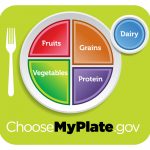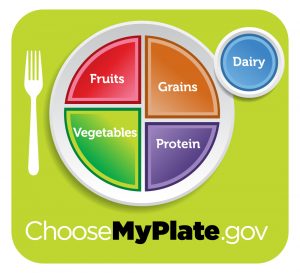Bulletin #4397, Eating for Health with MyPlate: Moving Toward an Active Lifestyle
Prepared by Extension Educator Kate Yerxa and Extension Specialist Leslie Forstadt, University of Maine Cooperative Extension. Reviewed by Extension Educator Alan Majka, University of Maine Cooperative Extension.
For information about UMaine Extension programs and resources, visit extension.umaine.edu.
Find more of our publications and books at extension.umaine.edu/publications/.
Like most Americans, Mainers eat too much fat, sugar, sodium, and refined grains. These Eating for Health with MyPlate fact sheets can start you down the path to good health. Each one is about a different part of the 2020-2025 Dietary Guidelines for Americans and MyPlate healthy eating guidelines. You can learn what each part is, why it’s important, and how it matters to you and to your family. The MyPlate food groups are Grains, Vegetables, Fruits, Dairy, and Protein. This fact sheet explains the Dairy Group.
Moving toward healthy habits includes making healthy food choices. It also includes more daily activities, or exercise. This can help you move toward a healthier weight.
The amount of food you eat is energy in. The amount of energy that you use to do things is energy out. You need to balance energy in with energy out, to maintain your current weight
What is physical activity?
Physical activity is moving your body and using energy. This can include activities such as
- walking,
- cleaning your home,
- going up stairs,
- walking the dog,
- pushing a baby carriage,
- doing yard work,
- shoveling snow, or
- dancing.
Start slowly. Every little bit adds up. Doing something is better than doing nothing. In time, you can work up to a faster pace. Your pace should make you breathe a little hard, while still able to talk. This pace gives you the most health benefits.
Why do I need physical activity?
Physical activity has many benefits. Being physically active can help your mind feel better as well as your body. It can help you get to and keep a healthy weight. Being active can reduce your risk for diseases such as diabetes, heart disease, and some types of cancers. Activity can help you build strong bones and muscles. It can also help control blood pressure.
How much physical activity do adults need?
The amount of physical activity needed is different for everyone. It depends on your age, how much you eat, and other factors.
Adults need a total of 2 hours and 30 minutes of moderate physical activity each week. This is an average of 30 minutes of physical activity on most days. This can sound like a lot of time, but it is OK to break your activity up into shorter times. You can get the same health benefits by doing 10 minutes of activity three times a day.
Some people need to keep from gaining weight. Or they may need more health benefits. These people may need 5 or more hours of physical activity each week. This is about 60 minutes of physical activity on most days.
To lose weight, you will need to put out more energy than you take in.
How can I increase my physical activity?
Here are a few tips to help you make physical activity a regular part of your daily routine:
- Choose activities you enjoy.
- Choose activities you can easily do on a regular basis.
- Get the family involved!
- Start or join a walking group in your neighborhood.
- Park at the back of the parking lot when you shop or go to work. That extra walking can add up!
- Replace a coffee or food break at work with a brisk 10-minute walk.
- No matter what you do, have fun!
Being active with kids
There are many fun ways to be more active with your children. With the TV turned off, there are lots of options to explore. Kids can help with house chores such as vacuuming and laundry. You can take walks with your children. Ask your kids to help with yard work. Have the entire family take the dog for walks. When you have a choice, take the stairs instead of the elevator.
Being active can help both you and children stay alert. Activity can even jump start your brain. This can help when it’s homework time.
Fun games to play
- Turn on some music and get everyone dancing. Play with jump ropes or hula hoops.
- Combine chores and family time to make both of them fun. Go outside and weed and water the garden together. Or try cleaning a room together. You can even make it into a game. Have a contest to see who can dust their side of the room first. The chores will get done faster, and everyone will get to spend time together.
- Have a real-life adventure. Go on a scavenger hunt in your neighborhood. Try to find 3 different green items, one paper item, and something that has to do with a bird.
Getting more active gives you and your kids more time to play. Follow your child’s lead in playing pretend. You can play tag, or make-believe. See what your child comes up with, and go along with it. Remember that you are setting an example for your children. If they see you having fun being physically active, they will want to do it, too.
Sources
U.S. Department of Agriculture and U.S. Department of Health and Human Services. Dietary Guidelines for Americans, 2020-2025. 9th Edition. December 2020. Available at DietaryGuidelines.gov.
U.S. Department of Agriculture. MyPlate website. 2021. https://www.myplate.gov
Keyser, Noelle. “Fun Ways to Enjoy TV-Free Family Time.” Families, Food and Fitness. eXtension.org. http://www.extension.org/pages/19910/fun-ways-to-enjoy-tv-free-family-time.

Information in this publication is provided purely for educational purposes. No responsibility is assumed for any problems associated with the use of products or services mentioned. No endorsement of products or companies is intended, nor is criticism of unnamed products or companies implied.
© 2011, 2017, 2021
Call 800.287.0274 (in Maine), or 207.581.3188, for information on publications and program offerings from University of Maine Cooperative Extension, or visit extension.umaine.edu.
In complying with the letter and spirit of applicable laws and pursuing its own goals of diversity, the University of Maine System does not discriminate on the grounds of race, color, religion, sex, sexual orientation, transgender status, gender, gender identity or expression, ethnicity, national origin, citizenship status, familial status, ancestry, age, disability physical or mental, genetic information, or veterans or military status in employment, education, and all other programs and activities. The University provides reasonable accommodations to qualified individuals with disabilities upon request. The following person has been designated to handle inquiries regarding non-discrimination policies: Director of Equal Opportunity and Title IX Services, 5713 Chadbourne Hall, Room 412, University of Maine, Orono, ME 04469-5713, 207.581.1226, TTY 711 (Maine Relay System).


